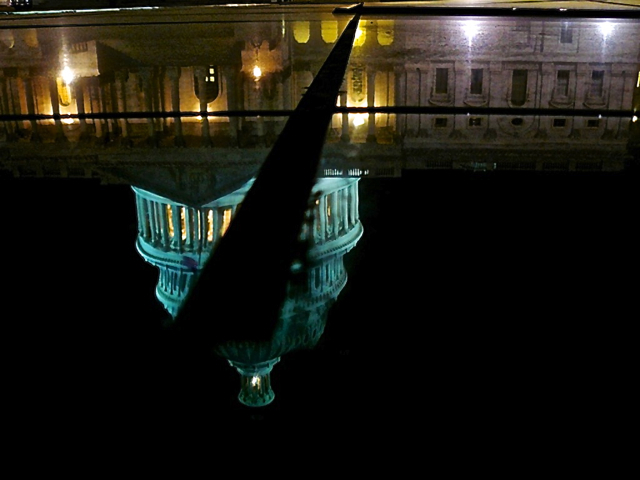Perhaps the only thing more frustrating than the government shutdown for those of us living in the United States has been the mainstream media’s coverage of the shutdown. Day after day, pundits speculate about how much the Tea Party-led campaign to defund the Affordable Heath Care Act by holding the nation hostage will hurt Republicans in the next election cycle. But they ignore the obvious: the ideologues responsible simply do not care.
That’s what Democrats and more established Republicans are either unwilling or unable to grasp. Yes, the Republicans may suffer losses in 2014, though decades of gerrymandering should ensure that most districts are protected. But the goal of this superficially quixotic effort to undo President Obama’s signature achievement was never to promote the Republican Party. Truth be told, many Tea Party supporters are almost as hostile towards Republicans in Washington as they are towards Democrats.
What they seek is not incremental change, a continuation of the United States’ rightward drift of the past four decades, but an abrupt cessation of business as usual. Shutting down the Federal government isn’t a strategy to get what they want: it is what they want. Sure, you’ll see Tea Party representatives paying lip service to the parts of Washington they theoretically support, such as the Pentagon and the monuments to American war-making that dot the Mall. Deep down, though, their hatred of the government goes so deep that they would be perfectly content to see even those parts of it farmed out to subcontractors.
No, the point of the shutdown isn’t to make a principled stand to improve Washington, but to abolish it altogether. All those Federal employees struggling now to get by without a paycheck, especially in the D.C. area, are expendable, for their very existence testifies to a reality to which the Tea Party contingent refuses to consent. So long as those employees aren’t working, the government isn’t working. And so long as the government isn’t working, it becomes that much easier to point to it from afar and say, “Look, the government no longer works.”
We are assuredly in Late Weimar territory here, with a sizable portion of those elected to run the national government bent on its destruction. Although it is true that no charismatic authoritarian figure has emerged to offer an alternative to Washington as we know it, space is being rapidly cleared for her or his arrival. The name “Tea Party” is more fitting than most commentators have dared to acknowledge, because, like its eighteenth-century namesake, it regards the government, not as something of, by and for the people, but an external oppressor that needs to be driven from American shores.
The problem, of course, is that, while the eighteenth-century Tea Party was rebelling against Great Britain, the current one is rebelling against the United States of America. It’s no accident that we’re seeing photos of protests in which Confederate flags figure prominently, because many Tea Party supporters truly believe that their land is occupied by a “foreign” power. Their animus against Washington is a direct descendant of the sort witnessed in the antebellum period, not only in the South, but in states like Pennsylvania and Illinois. Although they do not yet have a Richmond to rally around, the search is on.
The most clever aspect to this assault on the very idea of Washington is its use of the President. Like their Far Right predecessors in the Weimar Republic, Tea Party leaders have demonstrated a remarkable facility for personifying abstractions in a way that focuses their supporters’ rage. Ironically, Obama’s desire to model his Presidency after Abraham Lincoln’s, right down to the constitution of his Cabinet and his insistence on an expansive interpretation of Executive power, has played right into the hands of his most dangerous enemies. Even 150 years after the Battle of Gettysburg, the very idea of Lincoln remains anathema in many parts of the South. But what his legacy represents, the triumph of the Federal government over States’ rights and the concomitant centralization of power in Washington D.C., is hated far more broadly.
In the early 1990s, the cultural historian Dick Hebdige, famous for his analysis of the swastika in first-generation punk, turned his attention to the Confederate flag’s role in Scottish politics. Why, he wondered, were working-class folks with no particular connection to the American South so invested in its iconography? He insisted, as he had for the swastika before, that the flag had been sufficiently decontextualized to lose its more unsavory connotations. In Scotland, he argued, it merely symbolized resistance to London, without racial overtones.
Now this same argument is being made, more and more, about deployment of the Confederate flag within the United States itself. It doesn’t stand for white pride anymore, we’re told, but for what the War Between the States was really waged: the desire to preserve local autonomy in the face of Washington’s tyrannical dictates. The fact that the current President just happens to be black is merely a coincidence. And so is the correspondence between conspiracy theories about who Barack Obama really is and the paranoid fantasies of Reconstruction.
Opponents of the Tea Party need to stop wondering how many seats they could win back in the 2014 election and recognize the severity of the crisis. Because if the delegitimization of the Federal government continues to proceed at the present clip, there might not even be a 2014 election to worry about. That may sound unduly alarmist. But if the history of the Weimar Republic — or, for that matter, the Eastern Bloc in 1989 — teaches us anything, it’s that once a majority of people no longer believe in their government, political institutions can collapse in a matter of weeks. Rarely has the United States been in such grave danger of disintegration.
Photograph courtesy of the author





